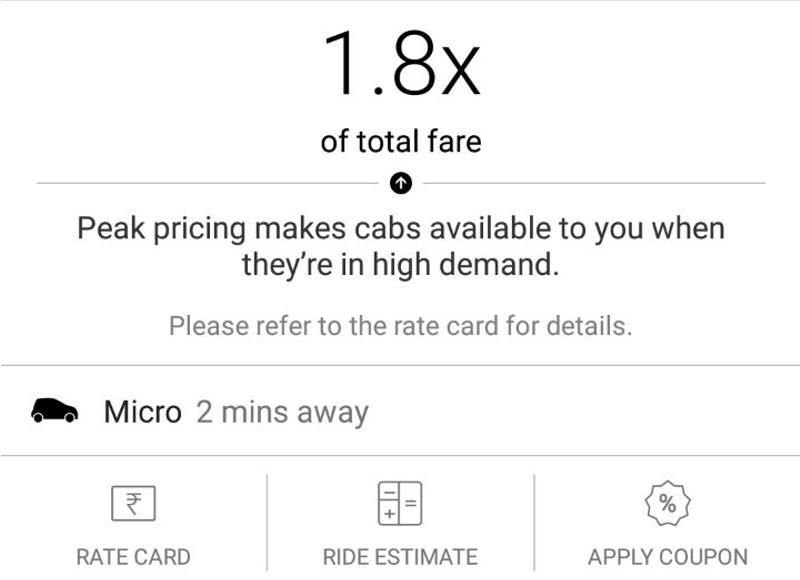Odd-Even Rule: Ola Follows Uber, Temporarily Pulls 'Peak Pricing'

Transportation aggregators Uber and Ola have both announced that they are temporarily disabling surge pricing or peak pricing in Delhi NCR, following a warning from Chief Minister Arvind Kejriwal on Monday.
In a tersely worded email statement, Ola said that it had temporarily pulled out 'Peak Pricing' in Delhi NCR, in support of the Delhi government's odd-even initiative, which was launched in its second phase last week, and saw its first full working day on Monday.
The company highlighted its volunteer efforts and ride-sharing initiative - Ola Share. The company said that it stationed volunteers at key traffic junctions, around metro stations and other high footfall areas in an on-ground campaign. Ola said that 100 percent of its Delhi's cab fleet has been running on CNG (compressed natural gas) since September 2015, as part of its commitment to pollution free transportation.
(Also read: Could Carpooling Be the Future for Uber, Ola and Others?)
The company did not make any further comments on the subject, and how it impacts its operations in Karnataka, where surge pricing was banned by the government recently. At the time of filing, peak pricing and surge pricing was active on both Ola and Uber's apps in Bengaluru, despite cars being impounded by the state transport authorities.
"We have notified that the maximum charge is Rs. 19.50 (per kilometre). They should not charge more than that," said Dr. Ramegowda, Commissioner of Transport and Road Safety, in a phone conversation with Gadgets 360. "There is no surcharge business in our notification, under our rule. Because of that violation of the surcharge business, we have seized so many vehicles. Every day we are enforcing it," he added.
Both Uber and Ola have yet to make a comment acknowledging that vehicles were seized in Bengaluru, and whether surge pricing will be deactivated in Karnataka.
Both Uber and Ola apply apply rates that are between multiples of 1 to 9.9x to meet a shortfall of cabs in demand. Uber argued that both airlines and hotels use the principle to match demand and supply.
For the latest tech news and reviews, follow Gadgets 360 on X, Facebook, WhatsApp, Threads and Google News. For the latest videos on gadgets and tech, subscribe to our YouTube channel. If you want to know everything about top influencers, follow our in-house Who'sThat360 on Instagram and YouTube.
Related Stories
- Galaxy S24 Series
- MWC 2024
- Apple Vision Pro
- Oneplus 12
- iPhone 14
- Apple iPhone 15
- OnePlus Nord CE 3 Lite 5G
- iPhone 13
- Xiaomi 14 Pro
- Oppo Find N3
- Tecno Spark Go (2023)
- Realme V30
- Best Phones Under 25000
- Samsung Galaxy S24 Series
- Cryptocurrency
- iQoo 12
- Samsung Galaxy S24 Ultra
- Giottus
- Samsung Galaxy Z Flip 5
- Apple 'Scary Fast'
- Housefull 5
- GoPro Hero 12 Black Review
- Invincible Season 2
- JioGlass
- HD Ready TV
- Laptop Under 50000
- Smartwatch Under 10000
- Latest Mobile Phones
- Compare Phones
- Moto G64 5G
- Moto G04s
- iQOO Z9 Turbo
- Vivo T3x 5G
- Realme P1 5G
- Realme P1 Pro 5G
- Redmi Turbo 3
- Oppo A3 Pro
- Asus ZenBook Duo 2024 (UX8406)
- Dell Inspiron 14 Plus
- Samsung Galaxy Tab S6 Lite (2024)
- Vivo Pad 3 Pro
- Cult Shock X
- Fire-Boltt Oracle
- LG 65-inch 4K Ultra HD Smart LED TV 65UR7500PSC
- Xiaomi 32 Inch LED HD Ready Smart TV (L32M6-RA-L32M7-RA)
- Sony PlayStation 5 Slim Digital Edition
- Sony PlayStation 5 Slim
- Lloyd 1.5 Ton 3 Star Inverter Split AC (GLS18I3FRCEV)
- Onida 1 Ton 3 Star Inverter Split AC (IR123MAG)

















